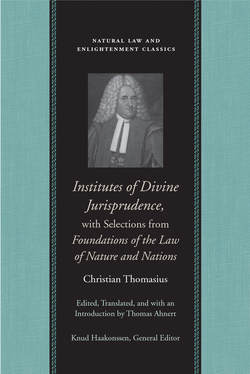Читать книгу Institutes of Divine Jurisprudence, with Selections from Foundations of the Law of Nature and Nations - Christian Thomasius - Страница 16
На сайте Литреса книга снята с продажи.
Оглавление[print edition page 144]
CHAPTER V
On the Duties of Man Toward God
§1. By a duty of man toward God we here do not mean some theoretical principle, but a practical one. And this principle does not regulate internal actions only, but mainly external ones. It is, however, not a first practical principle, but a specific one which can be demonstrated by way of a conclusion from the first principle of natural law or positive law.
§2. It is contained in this one precept: “Worship God according to the manner revealed by himself.”
§3. What we mean by God is evident from the preceding passages; by worship we mean an external human action, consisting in speech, deed, or gesture, which signals the attention and reverence that is due to another.
§4. Divine worship is sometimes divided into internal and external, yet internal worship is in fact not worship in the absolute and most proper sense, but only a presupposition of external worship.
§5. Thus, those matters which tend to be referred to internal worship—that man should honor and revere God, or that he should admire his supreme power and goodness; that he should love him as the author and giver of all good; that he should place his hope in him, as all our future happiness depends on him; that he should acquiesce in the divine
[print edition page 145]
will which does everything according to his goodness in the best possible way; that he should fear him as being all-powerful and the one whose displeasure can cause the greatest evil; finally, that in all matters he should most humbly obey him as creator, lord, and best and greatest ruler—all these, I say, insofar as they can be demonstrated from natural reason we already assume to be included in the first general principle of divine jurisprudence, “Obey God.”
§6. Thus, the external worship of God, that is, the worship of God in the simple sense, or the religious worship of God, is either general and thus common to most, if not all, nations, or special. The former, it seems, can be considered mainly in relation to three elements: the invocation of God, praising him, and showing gratitude.
§7. I call special external worship the different kinds of invoking, praising, and thanking God, which vary between nations. Among Christians, for example, this concerns the usual practice (or what should be the usual practice) of appealing to God in the name of Christ, with a mind free of vengefulness, in public, by extending one’s hands, baring the head, even toward one’s enemies, through music, fasting, and listening to the word of God. The sanctification of the Sabbath and the use of the sacraments, etc., also belong here.
